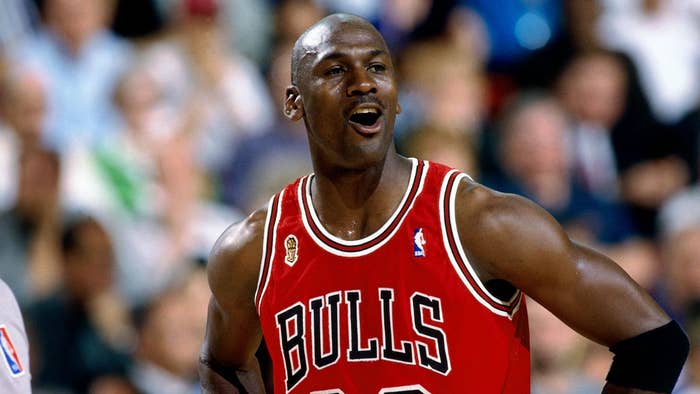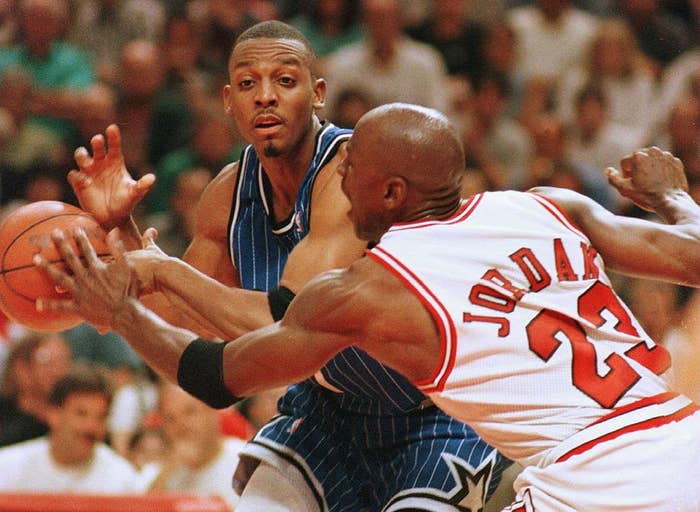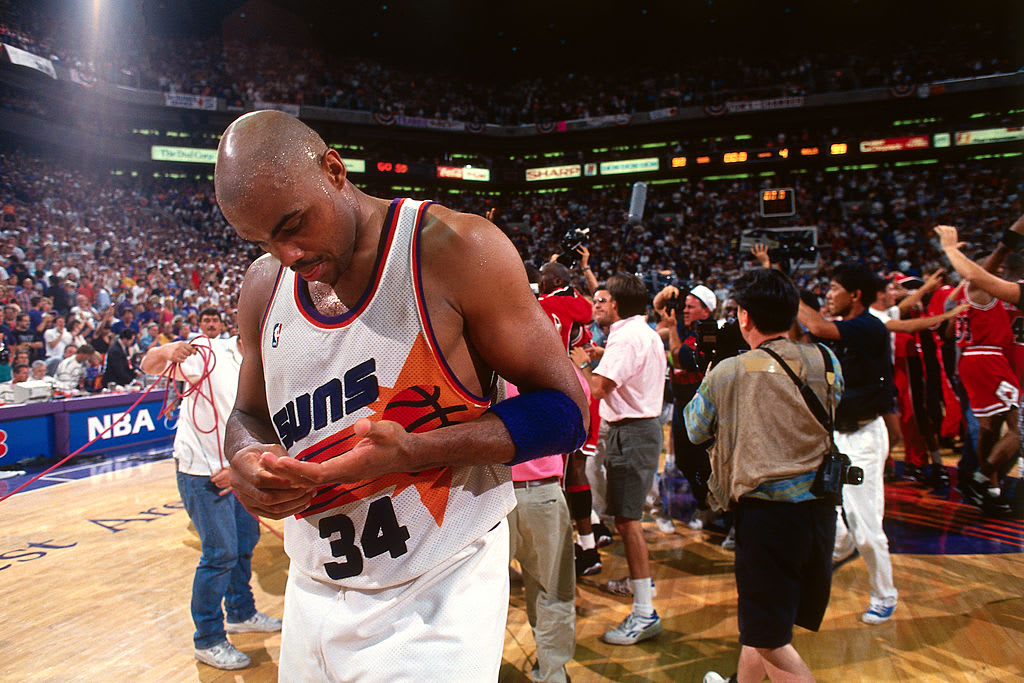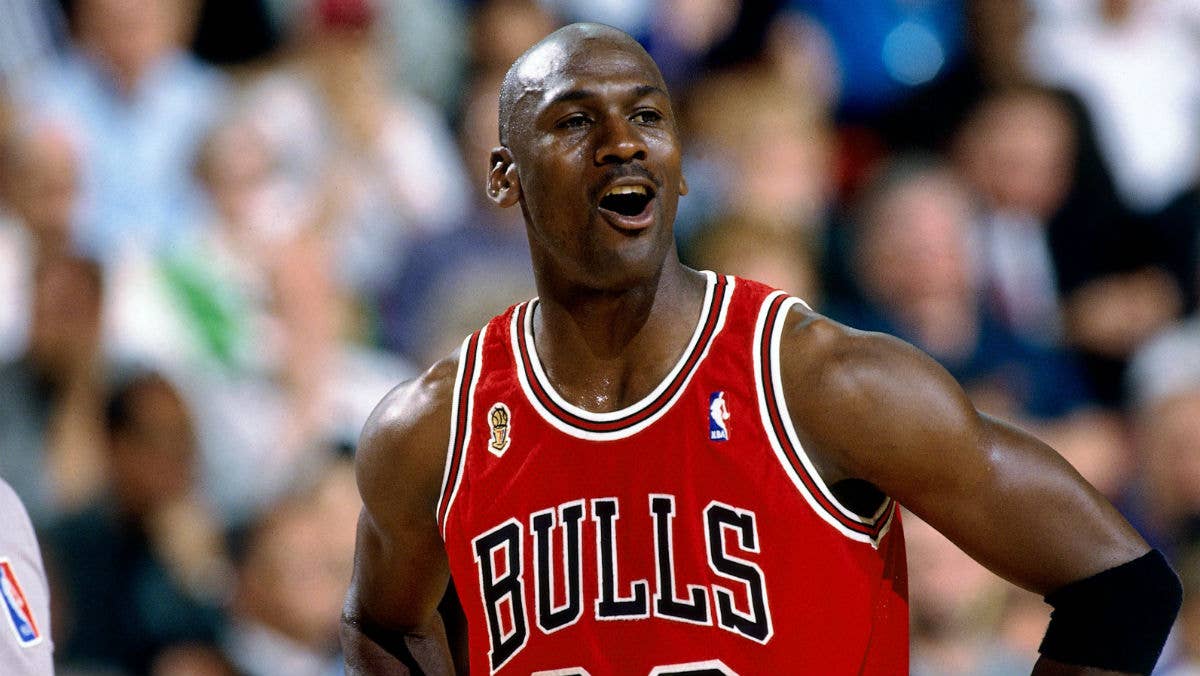
On Sunday, April 19, ESPN’s 10-part documentary The Last Dance will cover the final season of Michael Jordan and the Chicago Bulls, but also take the time to zoom out and look at the team that won six championships and entered the history books as one of if not the greatest dynasties in NBA history.
What the Bulls did along their way was destroy the dreams and championship aspirations of franchises and Hall of Fame players. Ahead of the documentary series, here are 10 career trajectories of players and entire franchises that were completely altered because of Michael Jordan:
New York Knicks
The 90’s New York Knicks—led by Patrick Ewing, Charles Oakley, and John Starks—were perennial contenders in the East and easily could have brought an NBA championship back to New York for the first time since 1973 except for one problem: Michael Jordan.
Jordan and the Bulls ended the Knicks season in the 1989, 1991, and 1992 playoffs. But the most crushing postseason defeat came in the 1993 Eastern Conference Finals. The Knicks took a 2-0 lead only to watch the Bulls come back to win the next four games, punctuated by the controversial Charles Smith Game in Game 5.
The Knicks did finally get their revenge against the Bulls the following season, beating them in the second round, but that was the year Jordan retired to play baseball. It didn’t matter either, as the Knicks went on to lose to the Rockets in the NBA Finals.
Instead of the team that brought glory back to Madison Square Garden, the 90’s Knicks will forever be remembered as a successful team that couldn’t get past Jordan.
Seattle Supersonics
The Sonics were another team in the West who spent years being a perennial disappointment in the postseason, and were best known for being upset by Dikembe Mutombo and the Denver Nuggets in the first round in 1994 until they finally reached the Finals in ‘96. Those Sonics were an absolutely stacked team, with Gary Payton and Shawn Kemp leading them, supported by veterans including Detlef Schrempf, Hersey Hawkins, and Sam Perkins.
In any other era, the ‘96 Sonics would be heavy favorites to win the championship, except they ran up against the Bulls. People will look back on the series and say it was a cakewalk for Chicago. They won the first three games and dropped the next two before closing it out in Game 6. But those final three games, especially after Gary Payton finally took on the assignment of guarding Jordan, you can’t help but think what could have been if Seattle didn’t spend so much time figuring out how to beat the Bulls in that series.
To this day, it feels like Payton and Kemp’s Sonics had the best team to take down the Bulls during their second three-peat, but instead their Finals appearance will be a footnote in the story of Jordan’s dominance.
Shaq and Penny
When Shaquille O’Neal and Penny Hardaway’s Magic eliminated Jordan and the Bulls in the 1995 playoffs, it felt like a passing of the torch. MJ had come back from baseball wearing No. 45, and didn’t look quite himself. Meanwhile, Shaq was already the most dominant one-man force in the league, and Penny was drawing comparisons to Jordan.
Except…it didn’t play out that way, as Jordan came back as determined as ever the following season, led the Bulls to a then-regular season record 72 wins and when the two teams faced off again, this time in the Eastern Conference Finals, Chicago won in a resounding sweep. Shaq left for the Lakers in the summer and just like that, dreams of a dynasty in Orlando were out the window, leaving the Shaq and Penny era as one of the greatest what ifs in NBA history.

Karl Malone and John Stockton
Stockton and Malone spent years battling the top teams in the West before finally breaking through in 1997 with their first NBA Finals appearance. Nearing the end of their careers, the duo had accomplished pretty much everything, with just a championship missing from their legendary resumes.
The Jazz were a formidable foe for Jordan and the Bulls, especially in the 1998 NBA Finals—Jordan’s final season with Chicago. But they weren’t good enough. Instead of ending their careers as champions, Malone will be remembered for winning an MVP that many felt belonged to Jordan (including Jordan himself), and both him and Stockton joined a long list of all-time great players who ended up on the no rings list thanks to number 23 in Chicago.
Reggie Miller
Reggie Miller was one of the most clutch shooters in NBA history—Knicks fans, look away as I link to the 8 points in 9 seconds video—but as the Pacers were making a rise up the East standings, they also happened to run into Jordan in the midst of the Bulls’ second three-peat of the decade.
Miller’s 1998 Pacers came closest of any team in the East to threatening Jordan and the Bulls during their second three-peat. The Eastern Conference Finals matchup went the full seven games, and Indiana actually led by double digits in Game 7. But they ended up falling short. It’s not fair, but Miller joins so many other shooting guards in the 90’s (hello, John Starks) as guys who will be remembered for never toppling Jordan.
Clyde Drexler
Believe it or not, there was a time when “is Michael Jordan is the best shooting guard in the league” was up for discussion. This was the case heading into the ‘92 Finals, when Clyde Drexler and the Blazers faced off against the Bulls. Jordan had won his first championship the year prior, and now some believed it was Drexler’s turn.
Jordan effectively ended any notion of being overtaken by someone else in the league in the series, and while Drexler did end up winning a championship in Houston later, no one dared to compare him to His Airness again.
Charles Barkley
The 1992-93 season felt like a storybook year for Charles Barkley. His first with the Phoenix Suns, Barkley won the Most Valuable Player award—unseating Jordan who had won the previous two seasons—and led his team to the NBA Finals.
Except, like pretty much everyone else in the 90’s, this is where I remind you the Bulls, with Jordan, lost one single playoff series the entire decade, to the aforementioned Shaq and Penny Magic. Despite his Hall of Fame resume and being one of the greatest power forwards of all time, the whole no rings and losing to Jordan thing is why modern day players like Draymond Green are allowed to say things like this.

The coaches
It’s not just the players. Think about how many coaches from the 90’s would have been thought about differently and ranked higher on people’s all-time lists if they had just won a championship, instead of finishing runner-up to Jordan and the Bulls.
How would Mike Dunleavy be viewed if his Lakers had beaten the Bulls in the 1991 NBA Finals. Rick Adelman was an offensive innovator, and would probably rank higher if Portland had gotten past Chicago in 1992. The same goes for Paul Westphal in Phoenix in 1993, George Karl with Seattle in 1996 and Jerry Sloan in Utah in 1997 and 1998.
No one will argue that they weren’t competent coaches, but the 90’s was a tough time to win a championship when Jordan wasn’t playing baseball, and all these coaches were denied a chance at completing their resumes.
The role players
The Bulls are certainly not the first NBA team to elevate the status of role players on their roster because of their success, but when you’re playing with Jordan and the Chicago Bulls, that elevation goes up a few notches.
It’s no disrespect to guys like John Paxson and Steve Kerr, who carved out long and successful careers on their own, but their Finals game-winning shots (Paxson against the Suns, Kerr against the Jazz) live on as iconic moments for a team that was bigger than basketball.
Phil Jackson
We could argue forever about whether Phil Jackson was the perfect coach to handle all of the superstar egos on the Bulls (probably) or if his coaching resume benefited from having coached some of the best players of all-time (a little bit of this).
Regardless of where you stand on that spectrum, it’s hard to argue that coaching Jordan and the Bulls to six championships didn’t elevate Jackson’s public profile just a tad bit. The championships are his and Jackson deserves more credit than just the guy who happened to coach Jordan during his prime, but the legacy of the Zen Master definitely grew in the 90’s thanks to it.

